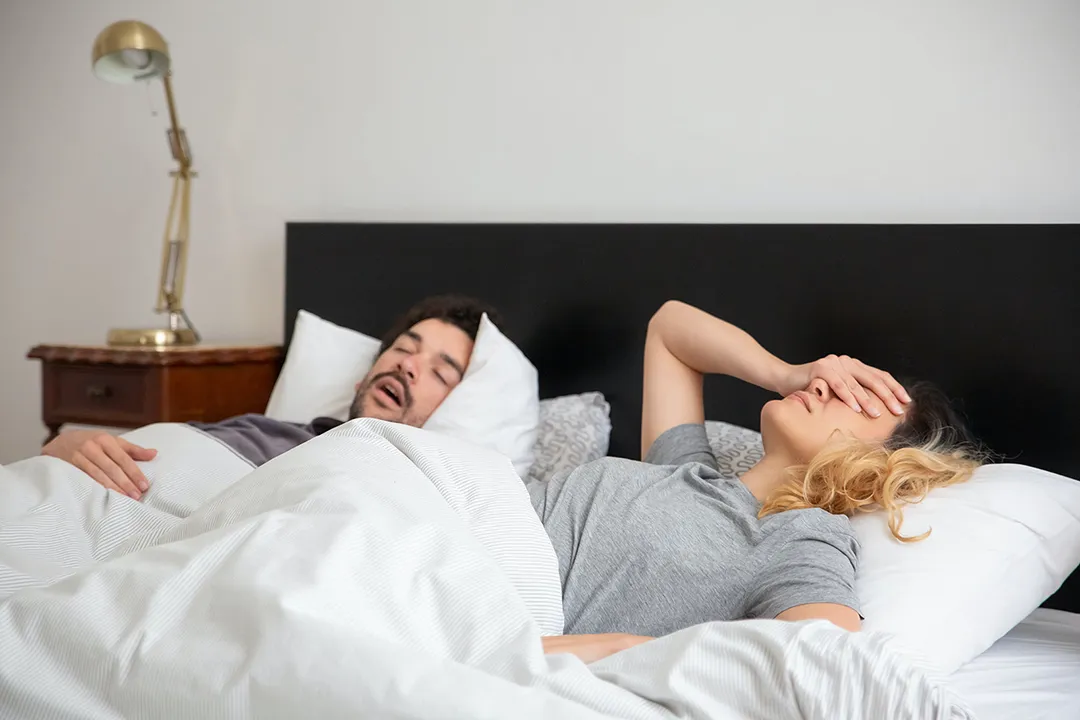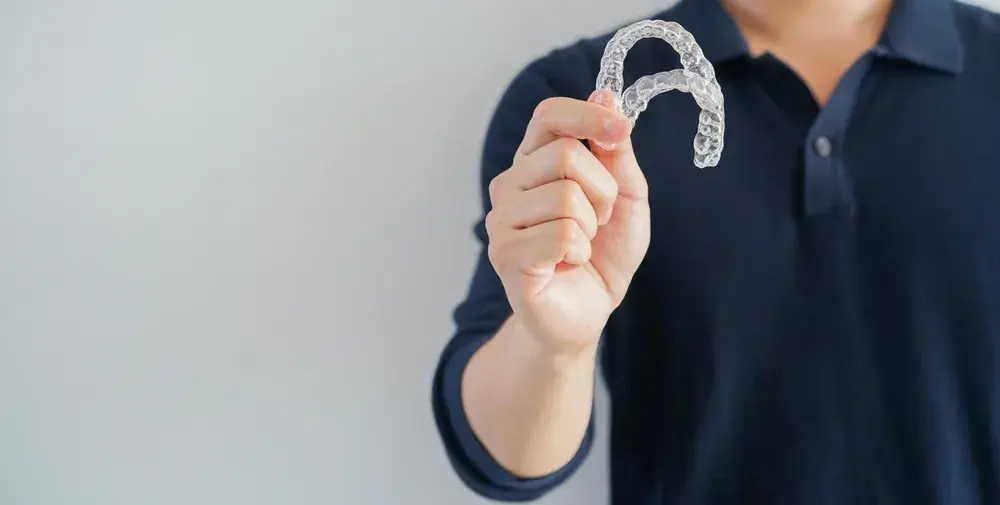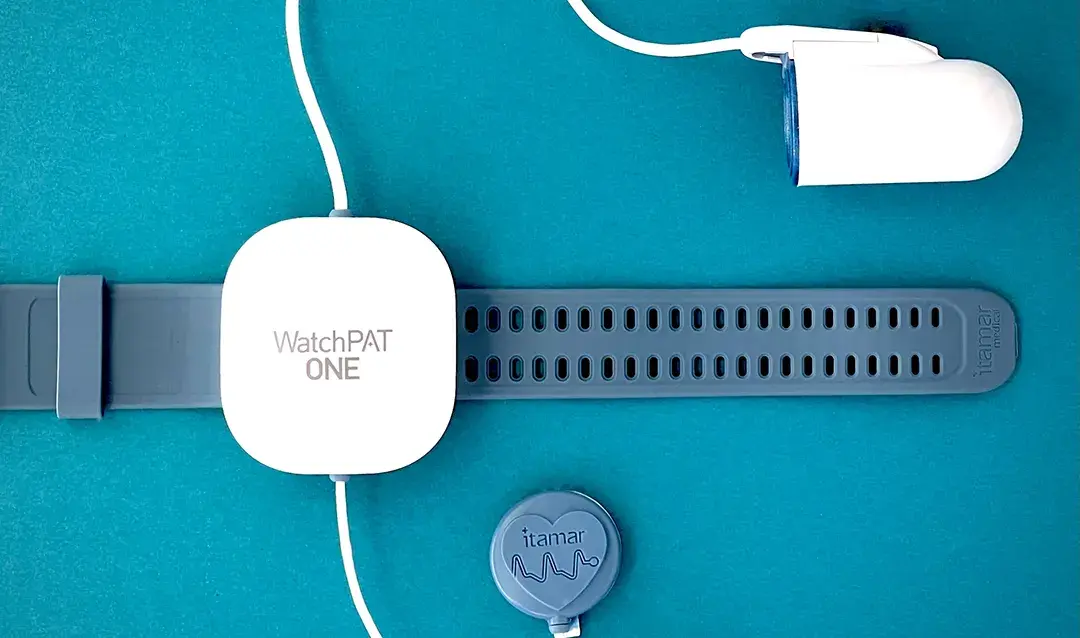Your Partner’s Sleep Apnea Could Be Damaging Your Health, Too
Fortunately, there are easy solutions

For many people, sleeping isn’t a solo journey. If your partner has a sleep disorder like obstructive sleep apnea (OSA), their symptoms won’t just take a serious toll on their own health and well-being — they can negatively affect you, too. After all, sharing a bed with someone who snores like a freight train or gasps for air in the middle of the night isn’t exactly a recipe for a good night’s rest.
“Before he got treated, I couldn’t sleep in my own bed,” says Renee T., whose partner was diagnosed with sleep apnea two years ago. “He didn’t even know he was waking up in the night and snoring all the time, which is amazing because it was happening so often and was just so incredibly loud. It took months until finally, one morning, I threatened to smother him with my pillow, and he could tell I wasn’t 100% kidding — then he finally did the sleep study. But the result was life-changing.”
1. You’re Just Not Getting Enough Sleep (and It’s Poorer Quality)
A recent study found that the spouses of people with sleep apnea tend to wake up more in the night and experience worse sleep than the spouses of healthy sleepers. In fact, OSA patients’ partners are three times more likely1 to have unrefreshing sleep, and they’re twice as likely to report daytime sleepiness and general fatigue.
“I dragged through the day, and I was tired all the time,” says Anne M., whose husband was diagnosed with sleep apnea last year. “I couldn’t concentrate, I couldn’t remember things, I missed appointments. My friends were annoyed with me because I’d totally forget we had a coffee date.”
On the surface, getting a bad night’s sleep may sound like nothing more than an annoyance, but the truth is, consistently bad sleep can lead to a wide array of emotional and physical health problems.
“When your partner has untreated sleep apnea, you may experience ‘microarousals,’ which means your brain wakes up, even if you don’t remember waking up. You also probably get actually woken up a lot and have a hard time getting back to sleep,” says sleep physician Inell Rosario, M.D. “This can lead to decreased sleep time as well as sleep quality, meaning you don’t get as much REM sleep, which your brain really needs. This causes decreased brain rest and can negatively affect your memory.”
2. There Can Be a Domino Effect on Your Emotional Well-Being
Studies show that one spouse’s sleep problems can lead to a whole host of issues for their partner, including feeling depressed, pessimistic, and dissatisfied. Untreated OSA can seriously affect partners' quality of life — in fact, more than 50% of partners report experiencing anxiety before their partner received treatment.
The truth is, sleeping next to someone who has sleep apnea can be downright scary. Often, the partners of people with OSA become nighttime guards, attuned to every pause in breathing. This constant vigilance can lead to its own form of sleep deprivation — and to feeling more like a caregiver than a romantic partner. For people who constantly feel like they have to check on their sleeping spouse, it’s like having a newborn baby that never grows up: the nights are long, and there’s no rest for the weary.
“He’d wake me up and I’d just lay there listening to him snore, until I realized he’d stopped breathing,” says Anne M. “There was this hitch in his breath, and I would count the seconds until he started again. Sometimes it would go on a long time, and I would wake him up because I was frightened and didn’t know what else to do.”
3. Sleep Apnea Can Take a Toll on Your Marriage
A lot of partners report using sleep medications or changing up their sleep schedule so they aren’t sleeping at the same time as their partners — and some couples even start sleeping in separate rooms. The emotional toll of this "sleep divorce" can lead to feelings of distance and a loss of intimacy. It's a tough decision for anyone — trading the closeness of getting to snuggle at night for a chance at a little solid shut-eye. Feelings of helplessness, anxiety, and even resentment can bubble up, and when you’re both sleep deprived, minor relationship issues that would normally be brushed aside as molehills can build into mountains.
“You have to understand, it would happen multiple times throughout the night. I barely got any sleep, and this went on for over a month,” says Anne M. “I was always cranky the next morning, and angry with him, even though I knew it wasn’t his fault, and I felt like it was ruining my marriage. You start to blame the other person for the lack of sleep. I’m not proud of that, but that’s how I felt. I was at my wits’ end.”
4. Your Physical Health Can Be Seriously Damaged, Too
Sleep deprivation can lead to a wide variety of health issues, and ultimately, your body doesn’t know that the lack of sleep it’s receiving is because your partner has an understandable sleep disorder like OSA — it just needs some rest. Consistently poor sleep can lead to lower immune function, increased risk of conditions like heart disease, hypertension, and type-2 diabetes. It’s associated with weight gain and obesity. The body needs rest to repair and rejuvenate, and without it, the health implications can be severe.
Not getting enough sleep is also terrible for your brain, and can result in impaired cognitive performance — meaning your brain just isn’t able to work the way it should. This can negatively impact your “psychomotor skills,” which control how well you do physical tasks like drive a car, cook a meal, or throw a ball, as well as your cognitive speed, which is your ability to process and understand information. It also impacts how well you can pay attention and remember things.
“Having a partner who is untreated for sleep apnea can give you, in a way, many of the effects of mild sleep apnea,” says Dr. Rosario. “You don't have the intravascular changes, but you do have all the brain arousal changes that sleep apnea causes — and they are terrible for your health.”
5. You Might Experience Hearing Loss
Consistent snoring is one of the most common symptoms of sleep apnea, and it can reach decibel levels that exceed the threshold for noise pollution. Even snoring that is perceived as “mild” reaches 40-50 decibels, which is louder than the World Health Organization recommends for a healthy sleep environment.
When you sleep next to someone who snores moderately, you’re being exposed to around 50-60 decibels, the equivalent of an air conditioner or regular conversation. But severe snoring can reach up to 70-80 decibels or even higher — the equivalent of a vacuum cleaner or garbage disposal. Over time, being exposed to this much noise isn't just disruptive to your sleep, it can lead to potential hearing damage and can even lead to permanent hearing loss.
6. The Good News: The Road to Recovery Is Easier Than You Think
Fortunately, the journey to managing sleep apnea can be easier than you’d think, and with the right treatment, both the patient and their partner can find better sleep and improved quality of life. In one study, some partners of sleep apnea patients said that they were able to fall asleep faster and had more energy. In another study, partners of OSA patients experienced less anxiety, daytime sleepiness, and had an overall better quality of life after their partners got treated.
“It was like the clouds lifted,” Renne T. says. “I felt like we finally got our marriage back on track. I know it sounds bad, but these days, I wake up happy to see him again, and I honestly just didn’t feel that before. I also get to relax at night knowing he’s not, you know, choking and not getting enough oxygen. He’s doing fine. I know he’s doing fine, so I can sleep, too.”
If you suspect you or your partner has sleep apnea, waiting won’t make the situation better. Taking an at-home sleep test is an easy, simple process that will give you the answers you need and set you up on a path to better sleep and a healthier relationship. By addressing your partner’s sleep apnea, you’re not just helping them — you’re also taking care of yourself and giving your relationship a chance to heal and grow.
Luyster FS. Impact of Obstructive Sleep Apnea and Its Treatments on Partners: A Literature Review. J Clin Sleep Med. 2017;13(3):467-477. Published 2017 Mar 15. doi:10.5664/jcsm.6504
Strawbridge WJ, Shema SJ, Roberts RE. Impact of spouses' sleep problems on partners. Sleep. 2004;27(3):527-531. doi:10.1093/sleep/27.3.527
Luyster FS, Dunbar-Jacob J, Aloia MS, Martire LM, Buysse DJ, Strollo PJ. Patient and Partner Experiences With Obstructive Sleep Apnea and CPAP Treatment: A Qualitative Analysis. Behav Sleep Med. 2016;14(1):67-84. doi:10.1080/15402002.2014.946597
Worley SL. The Extraordinary Importance of Sleep: The Detrimental Effects of Inadequate Sleep on Health and Public Safety Drive an Explosion of Sleep Research. P T. 2018;43(12):758-763.
Cooper CB, Neufeld EV, Dolezal BA, Martin JL. Sleep deprivation and obesity in adults: a brief narrative review. BMJ Open Sport Exerc Med. 2018;4(1):e000392. Published 2018 Oct 4. doi:10.1136/bmjsem-2018-000392
Goel N, Rao H, Durmer JS, Dinges DF. Neurocognitive consequences of sleep deprivation. Semin Neurol. 2009;29(4):320-339. doi:10.1055/s-0029-1237117
Sowho M, Sgambati F, Guzman M, Schneider H, Schwartz A. Snoring: a source of noise pollution and sleep apnea predictor. Sleep. 2020;43(6):zsz305. doi:10.1093/sleep/zsz305
Maimon N, Hanly PJ. Does snoring intensity correlate with the severity of obstructive sleep apnea?. J Clin Sleep Med. 2010;6(5):475-478.
Lawton E, Jurisevic M, Hobart K, Polaesk J, Fon A. The association between snoring and hearing loss in patients with obstructive sleep apnoea. European Respiratory Journal. 2022; 60(66)326.
Doherty LS, Kiely JL, Lawless G, McNicholas WT. Impact of nasal continuous positive airway pressure therapy on the quality of life of bed partners of patients with obstructive sleep apnea syndrome. Chest. 2003;124(6):2209-2214. doi:10.1378/chest.124.6.2209




